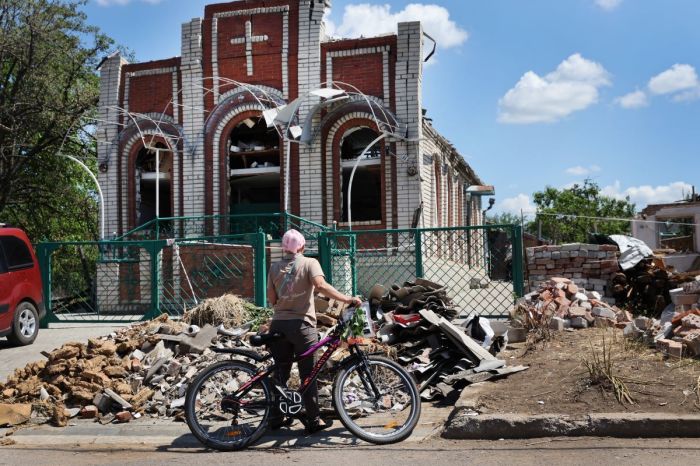'God uses evil': More Ukrainians requesting Bibles in native language, sharing Gospel as war rages

A Texas-based ministry that once smuggled Bibles into the Soviet Union in the 1960s is continuing to share God's Word decades later, even as war has shaken the lives of millions in Ukraine and Eastern Europe.
Today, the Eastern European Mission (EEM) is printing and distributing Bibles and other Gospel-centered materials through a vast network of churches and Christian organizations to Eastern Europeans in their native languages. In 2024, EEM set its sights on distributing 970,000 Bibles and other Bible-based materials in over 30 countries and 20 different languages.
This includes Ukrainians suffering displacement and crumbling infrastructure as the ongoing war with Russia has shattered any sense of normalcy, driving many refugees into Poland, Hungary, Moldova or other countries. Children are especially impacted.
Even before the start of Russia's invasion and the ensuing war with Ukraine in February 2022, EEM distributed Bibles to Ukraine. Now, the ministry has noticed Ukrainians forced to flee their homes, taking the message of the Gospel with them.
"God uses evil, and this war is definitely not from a good place, but God will use it," EEM Vice President Dirk Smith told The Christian Post.
According to data from the United Nations High Commissioner for Refugees, 6.8 million refugees from Ukraine are recorded globally and nearly 4 million displaced people in Ukraine as of November 2024.
Yet, even as the war rages on, the requests for Ukrainian Bibles has not ceased, according to Smith. EEM has seen an increase in requests, something that Smith attributed to Ukrainians seeking solace in God as they endure the trial of their country at war.
"We're seeing Ukrainians travel, and I think it's why the request for Ukrainian Bibles has increased because you've got Ukrainian believers who are migrating, and they're traveling alongside or staying with Ukrainians who are non-believers," Smith explained.
"And the non-believers are looking at the believers and going, 'OK, we're experiencing the same hell, but you're doing it very, you're handling this in a different way,'" the EEM vice president continued. "With a peace, dare I say, that surpasses understanding. And the non-believers ask, 'How is that?' and the believers are there to share Jesus."
Despite the conflict, Smith said EEM still prints Bibles in Kyiv and Western Ukraine. Due to the war, the ministry has witnessed the rerouting of supply chain channels from Poland or Moldova. However, at the time of the interview, Smith claimed EEM had yet to experience any other challenges.
On the ground in Ukraine, EEM works with various NGOS, ministries and churches run by Ukrainians. According to Smith, multiple ministries will contact EEM and request more Bibles when missile strikes happen.
For the ministry leader, the outpouring of requests for Bibles amid war serves as a reminder of the Holy Spirit's power.
"It is not about us," he said. "This is about the power of God's word when it gets into somebody's hand. It's the Parable of the Sower."
In Matthew 13, Jesus tells the Parable of the Sower to teach His followers about responding to the Lord's message and promise of eternal life. The farmer in the story sows his seeds, which represent God's word.
While some seeds fell on good soil and grew into crops, others were swallowed by birds, choked from the thorns or withered in the sun. Jesus told the story to show how God's word grows within those who listen while others are consumed by Satan or fail to allow the Gospel to thrive within their hearts.
"We sow the seed, and then we sit back and we watch in absolute amazement at God's power in subtle ways," Smith said.
Samantha Kamman is a reporter for The Christian Post. She can be reached at: samantha.kamman@christianpost.com. Follow her on Twitter: @Samantha_Kamman





























